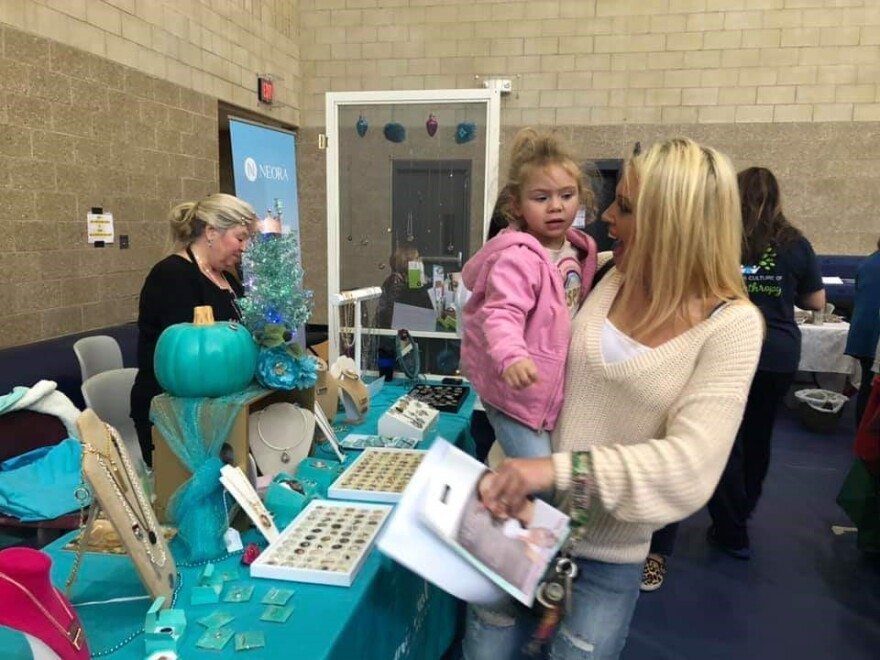States can get a substantial return on investment if they help single mothers in college access child care, support services and financial aid, according to a new study from the Institute for Women’s Policy Research.
But even though about 10% of all undergraduates in Kansas and Missouri are single mothers, neither state makes significant investments in helping them persist to graduation.
IWPR estimates it would cost between $7,000 and $8,000 per student mother to provide child care while she was enrolled in college, and Kansas and Missouri would get back up to $4.54 per dollar invested in the form of increased tax payments and reduced public assistance benefits after the mothers graduated.
Victoria Worden didn’t have affordable child care when she got pregnant the first time. With no one to watch her daughter while she did schoolwork, she had to drop out of college.
Now she’s trying again, this time with three young children at home.
“So sometimes I’m typing papers with Disney movies in the background really loud, which is distracting. Sometimes I’m holding a toddler,” said Worden, who’s working on an associate degree at Metropolitan Community College-Penn Valley. “Sometimes I’ll really get on a roll, you know, be doing really well and getting something done finally, and then they’ll have a big argument that stops everything.”

Worden isn’t alone. Nearly a quarter of all undergraduates in the United States are parents, but it’s single mothers who face the steepest odds to get to graduation. Only 8% of single moms in the U.S. earn an associate or bachelor’s degree within six years of their first enrollment in college, and the vast majority of them live in or near poverty while in school.
“Single mothers are very likely to start college but not finish, and I think that speaks to the drive that (they) have,” said Lindsey Reichlin Cruse, a study director who manages IWPR’s Student Parent Success Initiative. “They know that a college degree is the path out of poverty and into family-sustaining careers, but they’re not getting the support they need to be able to finish.”
For Victoria Hammond, a junior at the University of Missouri-Kansas City with two children and another on the way, the difference between having a college degree and not is about $30,000 a year. So she’s getting a degree in urban studies to advance her career in youth development.
“This piece of paper is the thing that will connect me to the next step,” said Hammond, who worked with urban youth at the YMCA for many years. “No matter how much experience I have, I’m missing that piece of paper.”
Hammond is getting support from KC Degrees, a community service organization that provides college and career counseling to adult students who go back to school to get the credentials they need. But it still isn’t easy. Just finding convenient child care has been a struggle. Hammond put her 2-year-old’s name down on the waitlist at the Berkley Child and Family Development Center on the UMKC campus when she was seven months pregnant, but a spot hasn’t opened up.
“Accessibility matters. If I’m taking my kids to school and daycare, and myself to school and work, that’s four different stops in the morning, and another four in the evening,” Hammond said. “I’m making eight trips a day.”
But UMKC has made other changes, like extended library hours, that have really helped Hammond. Sometimes she’ll take her 12-year-old daughter with her, and they’ll do homework together.
Worden said in many of her classes, more students have children than don’t. When nearly all K-12 students in the metro had an unexpected snow day last week in the middle of finals, one of Worden’s professors let her college students submit their written exams online so no one would have to scramble to find child care.

Worden hopes her daughters, who are 2, 8 and 11, see how hard she’s had to work to go back to school.
“I tell them all the time, ‘You see mommy doing this now, and it’s so much harder with all of life’s responsibilities? I really hope that you guys will do this when you get out of high school,’” she said. “I want them to get it over with before they have their own children.”
Elle Moxley covers education for KCUR. You can reach her on Twitter @ellemoxley.




